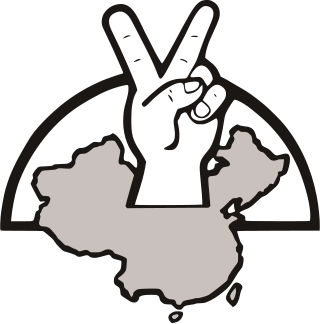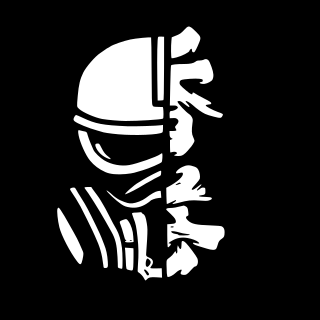
The Hong Kong Alliance in Support of Patriotic Democratic Movements of China was a pro-democracy organisation that was established on 21 May 1989 in the then British colony of Hong Kong during the 1989 Tiananmen Square protests and massacre in Beijing. After the 4 June massacre, the organisation main goals were the rehabilitation of the democracy movement and the accountability for the massacre. The main activities the organisation held were the annual memorials and commemorations, of which the candlelight vigil in Victoria Park was the most attended, reported and discussed event each year. Due to its stance, the Central government in Beijing considers the organisation subversive.

The Civil Human Rights Front (CHRF) was an organisation that focused on the issues of Hong Kong politics and livelihood, affiliated with almost all pan-democratic camps in Hong Kong. It was founded on 13 September 2002 and disbanded on 15 August 2021.

Jimmy Sham Tsz-kit is a Hong Kong pro-democracy and LGBT rights activist. He served as a convener for the pro-democracy organisation Civil Human Rights Front (CHRF) until October 2020 and serves as a secretary for the LGBT rights organisation Rainbow of Hong Kong. He is a longtime member of the League of Social Democrats. In 2019 he was elected to the Sha Tin District Council by residents of Lek Yuen constituency, but he resigned from this position in July 2021 amidst a government crackdown on pro-democracy councillors.

The month of June 2020 was the first anniversary of the 2019–2020 Hong Kong protests. The decision taken by the National People's Congress on national security legislation and the alleviation of the COVID-19 pandemic in Hong Kong led to a new series of protests and international responses. On 30 June, the Standing Committee of the National People's Congress passed the Hong Kong national security law which came into force the same day, leading to even more people protesting on 1 July.

Gwyneth Ho Kwai-lam is a Hong Kong social activist and former reporter of the now defunct news outlet Stand News, who rose to prominence for her frontline reporting in the 2019–2020 Hong Kong protests. In June 2020, she announced her candidature in the 2020 Hong Kong pro-democracy primaries, in which she obtained a nomination ticket in the general election that was later postponed. For her participation, she was arrested in January 2021 along with over 50 other pro-democrats on national security charges and was remanded in custody. In December 2021, she received a sentence of six months in relation to her role in a banned protest during the 31st anniversary of the 1989 Tiananmen Square protests and massacre in June 2020.

On 6 September, the biggest protests in the course of the 2019-20 Hong Kong protests since 1 July occurred in the city. The fresh protests were in a large part due to the day having been the scheduled election day for the Legislative Council; on 31 July, the Hong Kong government had the elections postponed by a year, citing the COVID-19 pandemic, a justification that was widely doubted. The unauthorized protests resulted in nearly 300 arrests, one of them on suspected violation of the national security law, and brought the total number of arrests during the entire protests since June 2019 to above 10,000.

The Hong Kong National Security Law is a piece of national security legislation passed on 30 June 2020 which was a major factor, besides the COVID-19 pandemic and its accompanying gathering regulations, in essentially ending the anti-extradition bill protests. The law established the crimes of secession, subversion, terrorism, and collusion with foreign organisations. Implementation of the law entitles authorities to surveil, detain, search and extradite persons suspected under its provisions to Mainland China.

Tonyee Chow Hang-tung is a Hong Kong activist, barrister and politician. During the crackdown by authorities on the Hong Kong Alliance in Support of Patriotic Democratic Movements of China, which began in June 2021 and was mainly based on national security charges over the Alliance's annual vigils in remembrance of the 1989 Tiananmen Square protests and massacre, Chow was cast into the limelight, having become the convenor of the group after the arrest of leaders Lee Cheuk-yan and Albert Ho in April. In December 2021 and January 2022, Chow was convicted respectively for inciting and taking part in an unlawful assembly on occasion of the vigil in 2020, and for organizing the vigil in 2021, and sentenced to a total of 22 months in prison. A trial date for further national security charges against Chow has not been set as of 10 November 2022. By that time, observers considered her to be possibly the most prominent remaining dissident voice in Hong Kong.

A suicide attack took place at approximately 22:10 on 1 July 2021, in Causeway Bay, Hong Kong. 50-year-old Leung Kin-fai approached a Police Tactical Unit police officer from behind and stabbed him, injuring the officer's scapula and piercing his lung, before Leung committed suicide by stabbing his own heart. Leung was immediately subdued by surrounding police, arrested and sent to hospital. He died at 23:20.

A dramatic manifestation of the far reach of the Hong Kong national security law was the mass arrest of 54 pro-democracy activists on 6 January. The arrested stood accused of subverting state power, a crime under the national security law, for their participation as candidates or in other capacities, in the 2020 Hong Kong pro-democracy primaries, which was part of a plan to increase pressure in parliament for democratic reform. Most of them were released on bail the following day. For the first time, the National Security Department of the police cited the national security law to block the website of HKChronicles. There were also several convictions in relation to the 2019-2020 Hong Kong protests.

On 22 February 2021, Xia Baolong, director of the Hong Kong and Macau Affairs Office, proposed that Hong Kong's governance had to be in the hands of "patriots". Observers considered it possible that the definition of "patriot" would require candidates for public office to embrace the rule of the Chinese Communist Party, as also suggested by Hong Kong Secretary for Constitutional and Mainland Affairs Erick Tsang; and that this signified a departure from the position that had prevailed since a speech by China's paramount leader Deng Xiaoping in 1984.

Few protests took place in March 2021 and there was no large-scale demonstrations in threat of the national security law. The charge against 47 pro-democracy activists for subversion on participating in a primary election was widely condemned by international community.

The city held its first National Security Education Day after the national security law had come into force. Chief Executive Carrie Lam emphasized that the law had helped Hong Kong to emerge from the "dark violence" of the 2019–2020 Hong Kong protests. National Security Committee Adviser Luo Huining also gave a speech. Even very young children were photographed handling toy weapons, which drew criticism.

On 14 May, authorities froze the assets of pro-democracy media tycoon Jimmy Lai. This was the first time that the pertaining provision in Article 43 of the national security law was applied. While Chief Executive Carrie Lam said on 18 May that the move would serve to bolster the status of Hong Kong as an international financial hub, several senior bankers and corporate lawyers not associated with Lai's accounts opined that the action – which was followed at the end of the month by a warning from the Security Secretary to banks against dealing with the frozen assets – was exposing risks for clients and top financial managers in Hong Kong.

Few protests took place in June 2021 and there were no large-scale demonstrations in threat of the national security law. The anniversary of the 1989 Tiananmen Square protests and massacre on 4 June saw only small crowds or single individuals engaging in vigils in the vicinity of Victoria Park – the venue of large vigils on the same occasion in past years – before police dispersed them. The pro-democracy tabloid Apple Daily once again had its headquarters raided by police using the national security law; its executives were arrested. Security Bureau also froze the assets of three Apple Daily companies, which led the newspaper to print its final edition on 24 June. Many pan-democratic groups disbanded at the end of the month under pressure from the law.

After the 1 July police stabbing, Hong Kong police and the government characterized the incident as a "lone wolf" terrorist attack. Foreign media saw the stabbing as a sign of a steep decline of the reputation of the police in the eyes of some locals, a process that had begun with the 2019–2020 Hong Kong protests. They also considered the uncovering of a bomb plot on 5 July as evidence of a polarization in society, and pointed to the influence of diminishing legal ways to voice dissent in the year since the national security law came into effect. At the beginning of the month, the police arrested citizens who posted on the Internet for inciting others to kill the police. Later it persecuted members of the student union of Hong Kong University for having passed a motion, subsequently withdrawn, that had praised the "sacrifice" of the deceased attacker of 1 July.

Several more pro-democracy organizations dissolved under the pressure of the national security law. The Hong Kong Confederation of Trade Unions additionally cited physical threats that had been reported by members. The disbandment of the Hong Kong Alliance followed the arrest of its leadership under charges of collusion with foreign forces, adding to earlier arrests of its lead figures. Student Politicism also dissolved.

Returning Valiant was a pro-independence group in Hong Kong. Formed mainly by students under the Hong Kong national security law in 2020, the group called for continuation of protests to "liberate the city".

The Hong Kong National Front (HKNF) is a political organisation that advocates the independence of Hong Kong from China. Originally based in Central, Hong Kong, it was forced to cease its activities in the city following the imposition of the Hong Kong national security law on 30 June 2020. The group currently operates in exile in Taiwan and the United Kingdom.









